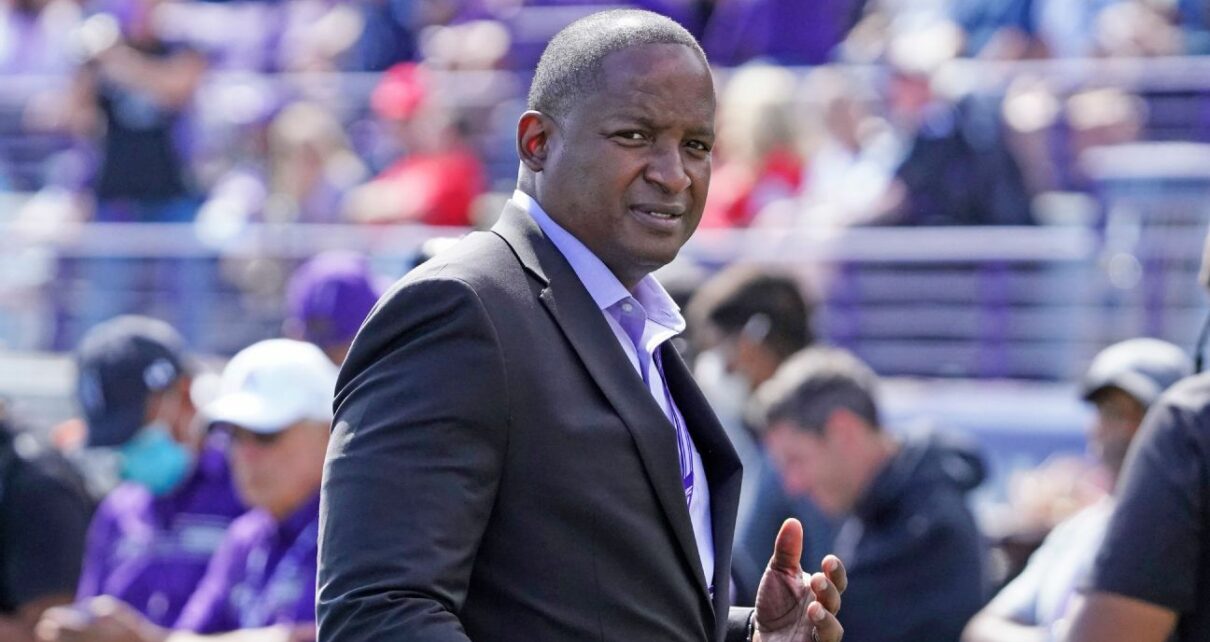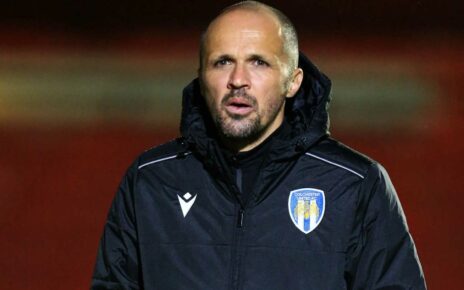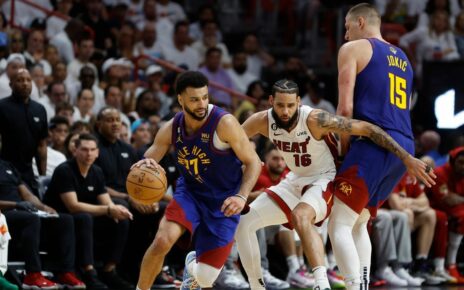
- College football reporter.
- Joined ESPN.com in 2008.
- Graduate of Northwestern University.
INDIANAPOLIS — Northwestern’s athletic teams will begin participating in mandatory, in-person anti-hazing seminars conducted by outside groups, beginning with the football team, as athletic director Derrick Gragg said he is committed toward making sure that “nothing like this ever happens again.”
In his first interview since football coach Pat Fitzgerald was fired on July 10, Gragg told ESPN that he is determined to remove any hazing from the school’s athletic teams while also supporting athletes in a program that has drawn widespread criticism this month.
“This entire situation, it’s distressing,” Gragg told ESPN. “My heart goes out to everyone who’s involved — victims, of course — but I also want to stress that we have many student-athletes who do the right thing and have always done the right thing, and coaches and staff as well. As the situation evolves, we’re very serious about eradicating anything that’s wrong, the president and the university.
“Not only eradicating it, but also trying to ensure, to the highest levels, that nothing like this ever happens again.”
Northwestern is facing four lawsuits from former football players over hazing and mistreatment within the program, and another from a former volleyball player. Gragg also fired baseball coach Jim Foster on July 13, following an investigation into bullying and mistreatment. Attorneys have also mentioned possible lawsuits involving Northwestern’s softball and soccer programs.
Gragg said Northwestern will investigate any claims or evidence of hazing involving its athletic programs.
In addition to the anti-hazing seminars, Gragg said Northwestern is ensuring that its system for anonymously reporting hazing or other mistreatment is functioning correctly. He also plans to form a committee of experts on hazing and other misconduct, and “enhance our education” in those areas.
“Sometimes people try to maybe scale things, but we have to ensure that student-athletes are properly bonding and that no one feels compelled or pressured to do anything that they don’t want to do,” Gragg said. “There’s no place for that. There’s no place for hazing. There’s no place for misconduct. If you’re going to continue to build a positive culture, you have to eradicate it.”
Both Gragg and university president Michael Schill, who decided to fire Fitzgerald three days after announcing a two-week, unpaid suspension for the coach, have drawn criticism for not holding a news conference to address the situation. Gragg said he has spent the past two weeks meeting with athletes, coaches, staff, trustees and others around the program.
“There are a lot of issues, a lot of sensitivities around legalities, so I wanted to make sure that I was in total lockstep with the university,” Gragg said “You’ve seen the president has been more outward-facing. I obviously never wanted to do anything to preempt him or be in front of him. So I have concentrated 100% on internal messaging, first of all with the student-athletes and everyone connected with our program.”
Schill backed Gragg in an interview Monday with The Daily Northwestern, saying there’s “no conversation” about Gragg’s employment status.
“My background as a former student-athlete and a leader, it’s in times like these … where I’m most effective, to be honest,” Gragg said. “It starts with internal communication and making sure that our internal systems are in place and that we’re communicating how we’re going to move forward.”
Northwestern launched an external investigation into hazing within the football program shortly after receiving allegations from a player on Nov. 30. Gragg, who has seen the full investigation but said he cannot discuss details, told ESPN that he received “a fair amount of information” as the investigation progressed, and was part of a small group that informed Fitzgerald of the two-week suspension and other corrective actions for the program, including no more off-campus preseason practices and a locker room monitor. Shortly after, Gragg went overseas for a pre-planned trip to celebrate his anniversary.
The university announced Fitzgerald’s two-week suspension July 7. As details of the hazing allegations emerged in a July 8 report from The Daily Northwestern and Schill began to reconsider Fitzgerald’s penalties, Gragg remained in regular contact with the president and other campus leaders. Gragg said he and the school mutually decided that he should remain in place rather than risk losing the ability to communicate while traveling back to the United States.
Gragg participated in the call to inform Fitzgerald that he had been fired, but he would not reveal details of that call to ESPN. Gragg also addressed players via Zoom during a team meeting on the night of July 10.
Several players expressed frustration on social media that Gragg and Schill were not present at the meeting, and that Gragg did not take questions.
“It was extremely difficult,” Gragg said. “Faced with the options that we had and only being able to deliver news, via Zoom, of this magnitude was obviously not optimal, which is why I took every measure I possibly could to be back. … No one in this situation would ever choose to have to deliver that type of news from afar.”
Gragg returned to campus early on July 11 and said he has been meeting regularly with football players, including Northwestern’s leadership council. He said he never sensed players did not want to go forward with the season, which begins Sept. 3 at Rutgers, and thinks the team is handling the situation “as best as they possibly can.”
He also told ESPN that he recognizes the disappointment felt by alumni and others about what has been revealed in recent weeks. A College Football Hall of Fame player at Northwestern, Fitzgerald led the team for 17 years and is the school’s all-time winningest coach.
“It’s impactful across the entire university, just because of what he has meant to so many people” Gragg said. “I liken it to when I was at Arkansas, when [basketball coach] Nolan Richardson was relieved of his duties. It’s on that scale. So my heart goes out to everyone who’s been involved with this, and I understand the angst of the decisions.”
Defensive coordinator David Braun was named interim head football coach, and all other assistants and staff have been retained for the 2023 season — although Northwestern is reviewing allegations from a lawsuit filed by former player Lloyd Yates that defensive backs coach Matt MacPherson witnessed several hazing incidents.
Big Ten commissioner Tony Petitti said he has spoken several times with Gragg in recent weeks about the situation. Petitti also has spoken with Braun.
“The investigations will yield results about what has happened,” Petitti said. “I think there’s a commitment to understand what’s expected [of them] going forward.”
No players were named in Northwestern’s external investigation or in any of the lawsuits filed so far. Yates on Monday said he considers all players “victims” of what he described as a toxic hazing culture, even those who led the alleged hazing activities.
“No current players were named in any of the allegations, but obviously if anyone’s name appears or we get more allegations from more teams or whatever, we’ll make sure that they are investigated,” Gragg said.
Hired by Northwestern in June 2021, Gragg said he’s responsible for the decision to hire Foster. Although allegations around Foster surfaced in late 2022, Foster coached the entire season.
Asked why it took so long to fire the baseball coach, Gragg noted that “everyone’s afforded due process.”
Source: Read Full Article


